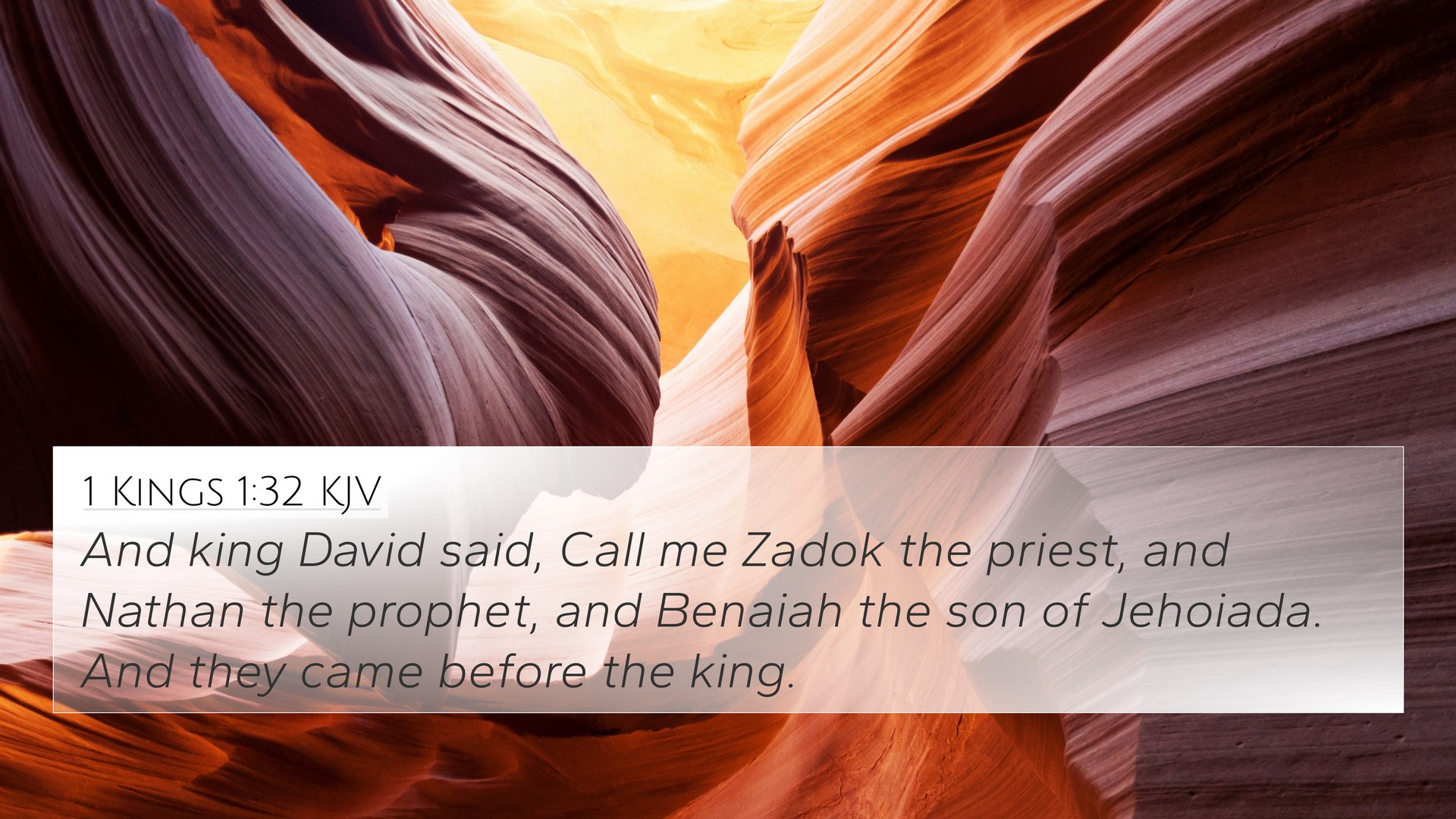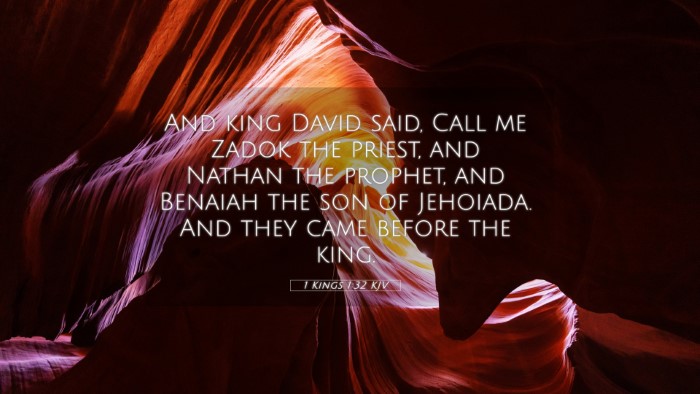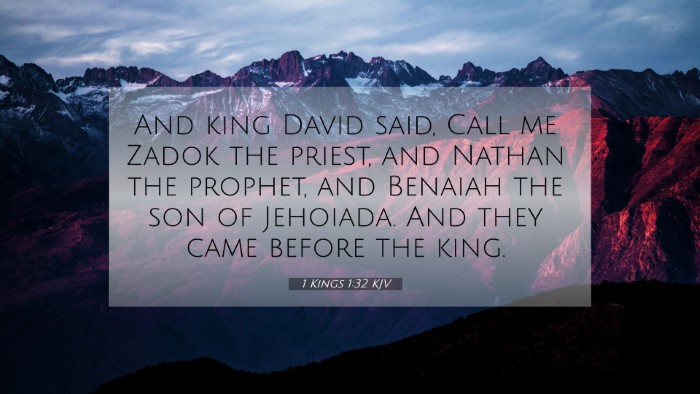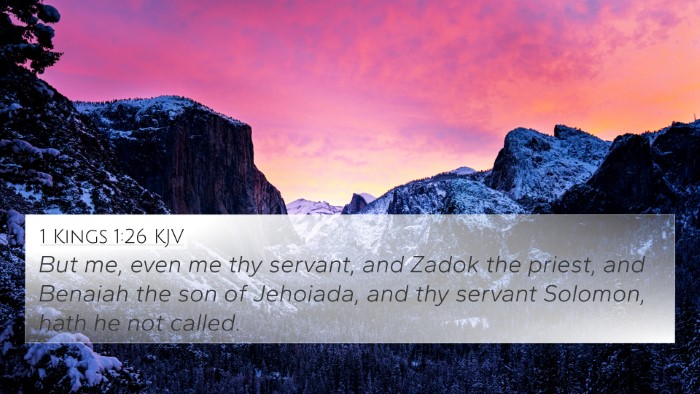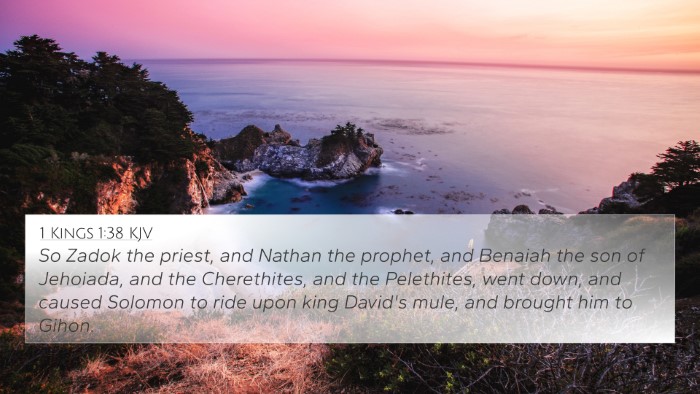Understanding 1 Kings 1:32
Bible Verse: 1 Kings 1:32 — "And King David said, Call me Zadok the priest, and Nathan the prophet, and Benaiah the son of Jehoiada. And they came before the king."
Summary of Meaning
In this pivotal moment, King David instructs several key figures to be summoned as he decides how to address the situation regarding the succession of his throne. The mention of Zadok the priest and Nathan the prophet highlights the importance of prophets and priests in Israel's governance and spiritual life. Benaiah, as a military leader, denotes the importance of aligning spiritual leadership with military authority during a time of potential conflict.
Context of the Verse
The context of 1 Kings 1 illustrates a critical transitional period in Israel's history, where King David is nearing the end of his reign. His actions ensure a rightful succession against the backdrop of potential usurpation by Adonijah, one of his sons. This verse, therefore, serves as an introduction to important actions that signify God's ordained leadership structure.
Commentary Insights
-
Matthew Henry:
Henry emphasizes the significance of King David's call for Zadok and Nathan. He points out that David's reliance on spiritual leaders underscores the need for divine guidance during critical national matters.
-
Albert Barnes:
Barnes highlights the roles of the individuals invoked by David, noting that Zadok represented the priesthood and Nathan the prophetic voice, indicative of their influence in addressing the monarchy's legitimacy.
-
Adam Clarke:
Clarke mentions the implications of summoning such leaders, noting that their presence indicated a formal approach to resolving the conflict surrounding David's succession. He also underscores the urgency of David's actions to secure peace and order in Israel.
Related Bible Cross-References
- 2 Samuel 15:24-29 - This passage recounts the role of David's priests during Absalom’s rebellion, offering insights into the importance of spiritual leadership amidst political turmoil.
- 1 Chronicles 29:22 - This verses mirror the loyalty of the people, showcasing the transitional phase from David to Solomon, which ties into the themes of leadership and succession.
- 2 Samuel 7:12-16 - Here, God makes a covenant with David, promising that his lineage will endure, which provides a backdrop to David's urgency in establishing Solomon’s inheritance.
- 1 Kings 1:5 - This passage describes Adonijah's self-appointment as king, necessitating David's intervention, setting the stage for the gathering of key figures in the verse we are studying.
- Luke 1:32-33 - Jesus' Davidic lineage is referenced, showcasing the fulfillment of God's promise to David and the continuity of God's plan through history.
- Exodus 28:1 - This verse discusses the consecration of Aaron's sons as priests, defining the importance of priesthood in Israelite society and governance.
- 2 Chronicles 23:1-3 - The actions of the high priest during a royal coup relate to the themes of spiritual authority and the defense of rightful rule seen in 1 Kings 1:32.
- Matthew 22:43-44 - Jesus refers back to David's authority and the prophecy regarding his lineage, thereby linking New Testament teachings to Davidic themes.
- Romans 13:1 - This passage reinforces the idea of God's establishment of authority, tying into David's reliance on spiritual and political leaders.
- Hebrews 7:14 - This highlights Jesus' priestly role from the line of Judah, offering a theological reflection on David’s legacy and the continuity of God's promises.
The Importance of Leadership
This verse also accentuates the importance of collective decision-making in matters of leadership. David recognizes the need for counsel from both religious and military leaders, which signifies a holistic approach to governance.
Thematic Connections
1 Kings 1:32 provides thematic connections about divine authority, the role of prophecy, and how spiritual leadership intersects with political governance. The insights from the different commentaries enhance our understanding of the weight of David’s actions as he navigates the complexities of his kingdom's future amidst familial rivalry.
Cross-Referencing Biblical Texts
Understanding 1 Kings 1:32 requires awareness of other related scriptures. By engaging in a comparative Bible verse analysis with texts like those found in Matthew, Luke, and Romans, we can gain a deeper understanding of God's overarching plan and the consistent call for righteous leadership throughout the biblical narrative. This cross-referencing can be a useful tool in study settings such as group discussions or sermon preparation, revealing the interconnectedness of scripture.
Conclusion
1 Kings 1:32 encapsulates a crucial moment in biblical history, demonstrating the need for spiritual guidance in leadership. As we explore the rich context of this verse, we uncover themes that resonate throughout scripture, inviting further study and reflection on the nature of God’s promises and the unfolding narrative of His people.
